Is Autism Funding Taxable?

Navigating Tax Considerations for Autism Support and Funding
Families and individuals receiving autism funding and benefits often wonder about the tax implications of these supports. While most autism-related assistance generally does not constitute taxable income, specific circumstances and types of funding may have different tax treatments. This article explores whether autism funding is taxable, the tax implications of various supports and grants, eligible deductions and credits, and the significance of recognizing autism as a disability for tax purposes, all supported by authoritative sources and regulations.
Taxability of Autism Funding and Benefits
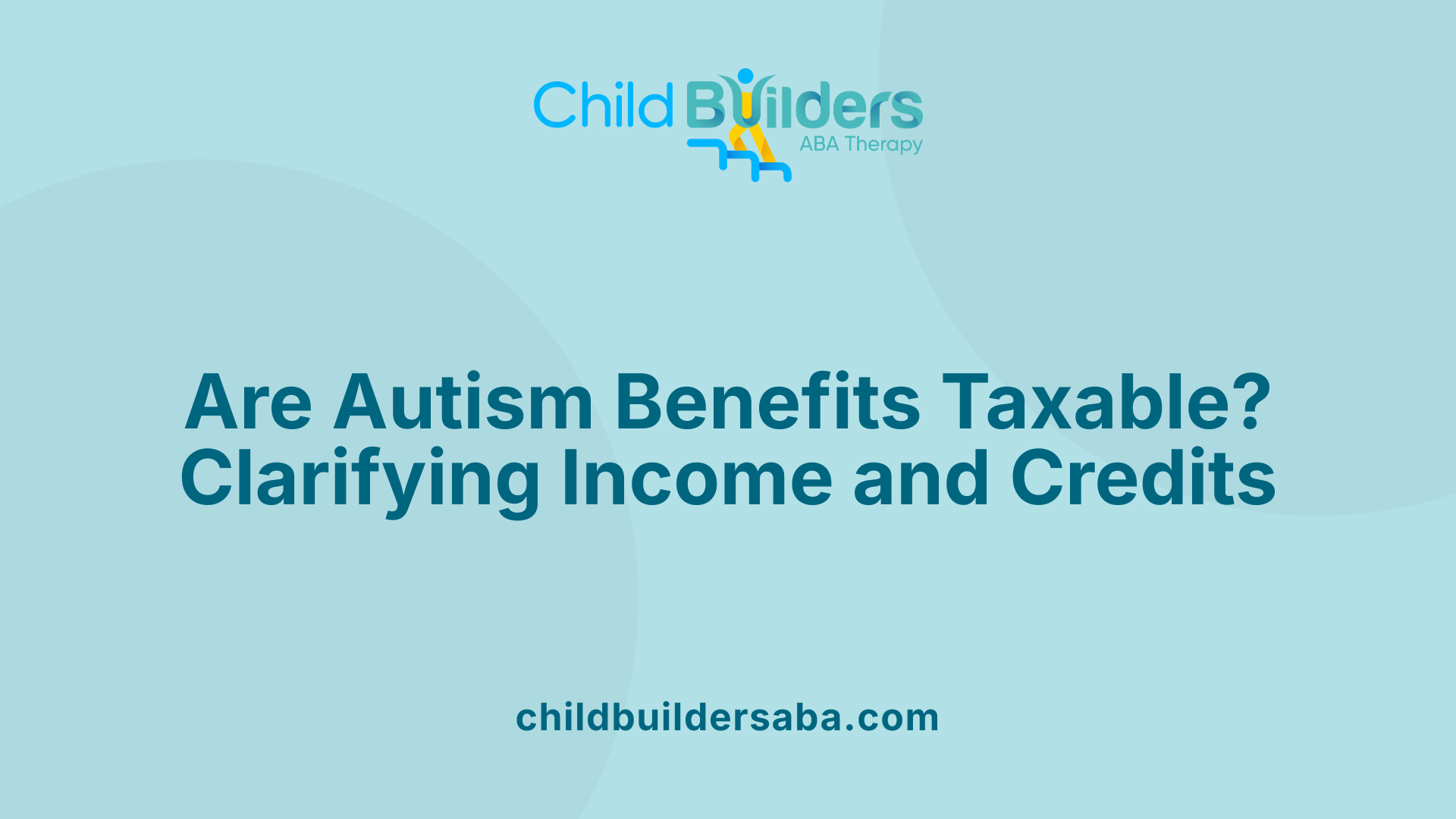
Is autism funding considered taxable income?
In general, funding and benefits related to autism, such as government assistance programs like Supplemental Security Income (SSI) or Social Security Disability Insurance (SSDI), are not treated as taxable income. These forms of support are designed primarily to assist families and individuals with disabilities and are usually exempt from federal income tax.
However, there are exceptions to this rule. Certain disability retirement benefits or specific benefits where the individual has paid the premiums might be considered taxable, depending on the situation. For example, if an individual received disability benefits as part of a retirement plan and paid premiums with after-tax dollars, part of those benefits could be taxable.
On the other hand, tax credits and deductions related to autism services do not increase taxable income. Instead, they serve as mechanisms to lower the total amount of tax owed, effectively reducing taxable income or providing a direct tax refund. Common credits include the Disability Tax Credit (DTC), Earned Income Tax Credit (EITC), Child and Dependent Care Credit, and deductions for qualifying medical expenses such as therapy, medications, assistive devices, and home modifications.
These credits and deductions are critical tools for families seeking to manage the financial impacts of autism. They can significantly reduce the taxable portion of income, amplify available benefits, and enhance overall financial stability.
Important considerations and advice
Because tax laws frequently change and individual circumstances vary, it is vital for individuals and families to consult specific IRS guidelines, such as Publication 907, or work with qualified tax professionals. Proper documentation—including receipts, medical reports, prescriptions, and records of expenses—is essential to substantiate claims for deductions and credits.
Maximizing the available tax benefits requires understanding the rules surrounding income classification and allowable expenses. While autism-related funding itself generally isn’t taxable, mishandling documentation or misapplying credits could lead to missed opportunities or compliance issues.
In conclusion, most autism-related government assistance falls outside the scope of taxable income, but some exceptions exist depending on benefit type and payment source. Utilizing available credits and deductions effectively can offer significant financial relief. Always stay informed of current regulations and seek professional guidance to optimize your tax situation.
Tax Implications of Autism Supports and Grants
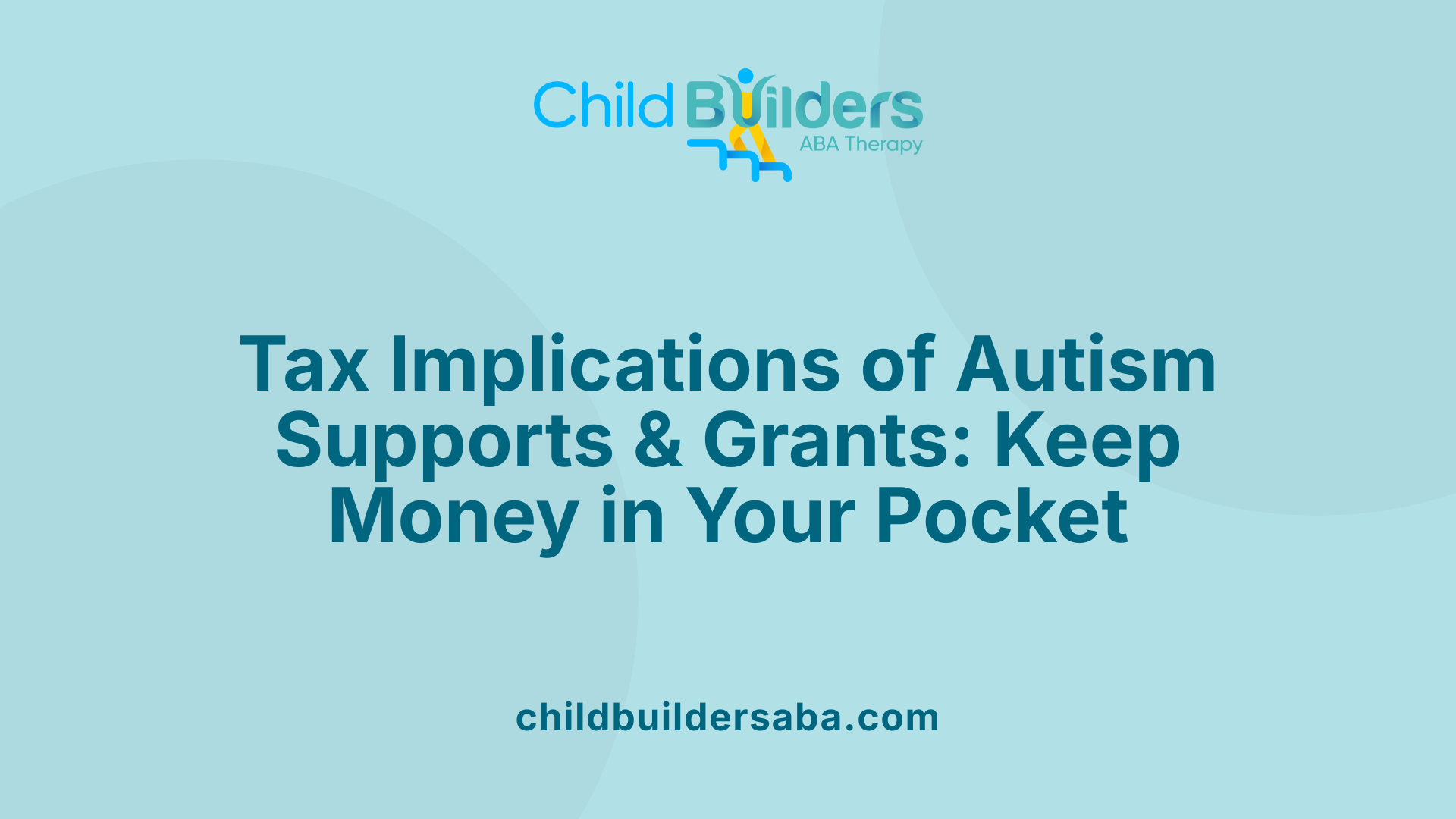
What are the tax implications of autism supports and grants?
Most autism-related funding and supports are designed to provide financial assistance without creating additional tax burdens for families and individuals. Generally, government-funded programs such as Medicaid, Supplemental Security Income (SSI), or private insurance reimbursements for autism therapies and services are not considered taxable income. These supports are considered benefits that aid in covering medical and care expenses.
However, exceptions exist for certain types of financial aid. Lump-sum grants, trust funds, or monetary awards received as part of special programs may have tax consequences depending on their structure and purpose. For instance, if a family receives a large monetary award that exceeds certain thresholds or is not specifically designated for medical costs, it might be subject to taxation.
Families often qualify to claim various medical expenses on their tax returns. Expenses such as therapies, medications, specialized equipment, and home modifications related to autism treatment can typically be deducted if they exceed the IRS (or relevant tax authority) thresholds, usually 7.5% of Adjusted Gross Income (AGI). This can significantly reduce taxable income.
Tax credits also play an important role. The Child and Dependent Care Credit, for example, can offset expenses related to the care of a child with autism who cannot care for themselves. This includes therapy, specialized care, transportation, and equipment. Moreover, savings programs such as the Registered Disability Savings Plan (RDSP) in Canada or 529 plans in the U.S. offer tax advantages for families saving for long-term needs, including education and healthcare, for a disabled child.
Deductions for related expenses like specialized schools, home modifications, and travel for medical care are available in many jurisdictions, further easing financial burdens.
It is essential for families to consult resources from IRS or local tax authorities and seek advice from qualified tax professionals. Proper documentation of all expenses, includingReceipts, prescriptions, insurance reimbursements, medical reports, and detailed records of expenses, is crucial. These steps ensure compliance and help maximize available benefits.
Overall, understanding the tax rules surrounding autism supports and resources helps families optimize their financial planning while navigating available benefits and avoiding unexpected tax liabilities.
Eligibility of Autism-Related Expenses for Tax Deductions and Credits

Are autism-related expenses eligible for tax deductions or credits?
Yes, autism-related expenses can often qualify for various tax deductions and credits, providing financial relief to families caring for individuals on the spectrum. Eligible medical costs include a broad range of services and items directly related to autism treatment and support.
Families can deduct expenses such as therapy sessions—behavioral, speech, occupational, and physical therapies—diagnostic evaluations, and specialized educational services. These expenses must be primarily for treatment, prevention, or alleviation of autism symptoms, and usually require a healthcare provider’s recommendation or diagnosis documentation.
Additional deductible costs include expenses for special diets, assistive devices, specialized equipment, and home modifications like ramps or lifts, if prescribed by a doctor. Travel expenses to medical appointments, including mileage, transportation, and overnight lodging needed for treatment, are also deductible.
Legal services related to securing appropriate medical care or enforcing Individualized Education Programs (IEPs) are eligible as well. For example, legal assistance to obtain necessary educational services or disability benefits can be claimed.
In terms of tax credits, the Child and Dependent Care Credit can be claimed for expenses incurred caring for a child under 13 or a disabled dependent who cannot care for themselves. This includes costs associated with therapy, transportation, and specialized care providers. The credit ranges from 20% to 35% of qualifying expenses, up to annual limits.
Moreover, working families may benefit from the Earned Income Tax Credit (EITC) if their child with autism is considered a disabled dependent under IRS criteria. Certification of the child’s disability through a qualified medical professional is necessary for this qualification.
Families also have access to tax-advantaged accounts such as ABLE (Achieving a Better Life Experience) accounts, which allow tax-free growth and withdrawals for qualified disability expenses. Contributions to ABLE accounts are capped (e.g., $17,000 per year for 2024), but distributions used for approved expenses are tax-exempt.
Similarly, education savings plans like 529 plans, especially those designed for individuals with disabilities, can provide tax benefits when saving for post-secondary education costs.
Beyond federal programs, many state and provincial supports—including grants, respite care, and therapy subsidies—offer additional financial help, although the tax treatment of these varies. In Canada, the Registered Disability Savings Plan (RDSP) provides a means for families to save with government grants and bonds, with tax-deferred growth.
It is essential for families to keep detailed records of expenses—receipts, prescriptions, medical reports, and evaluations—to substantiate claims. Consulting tax professionals or IRS guidelines helps ensure that all eligible costs are properly claimed and that families maximize their available benefits.
In summary, numerous tax deductions and credits are available for autism-related expenses, ranging from direct medical costs to supportive services and savings accounts. Proper planning and documentation are crucial to leverage these benefits effectively.
Understanding Autism as a Disability in Tax Context
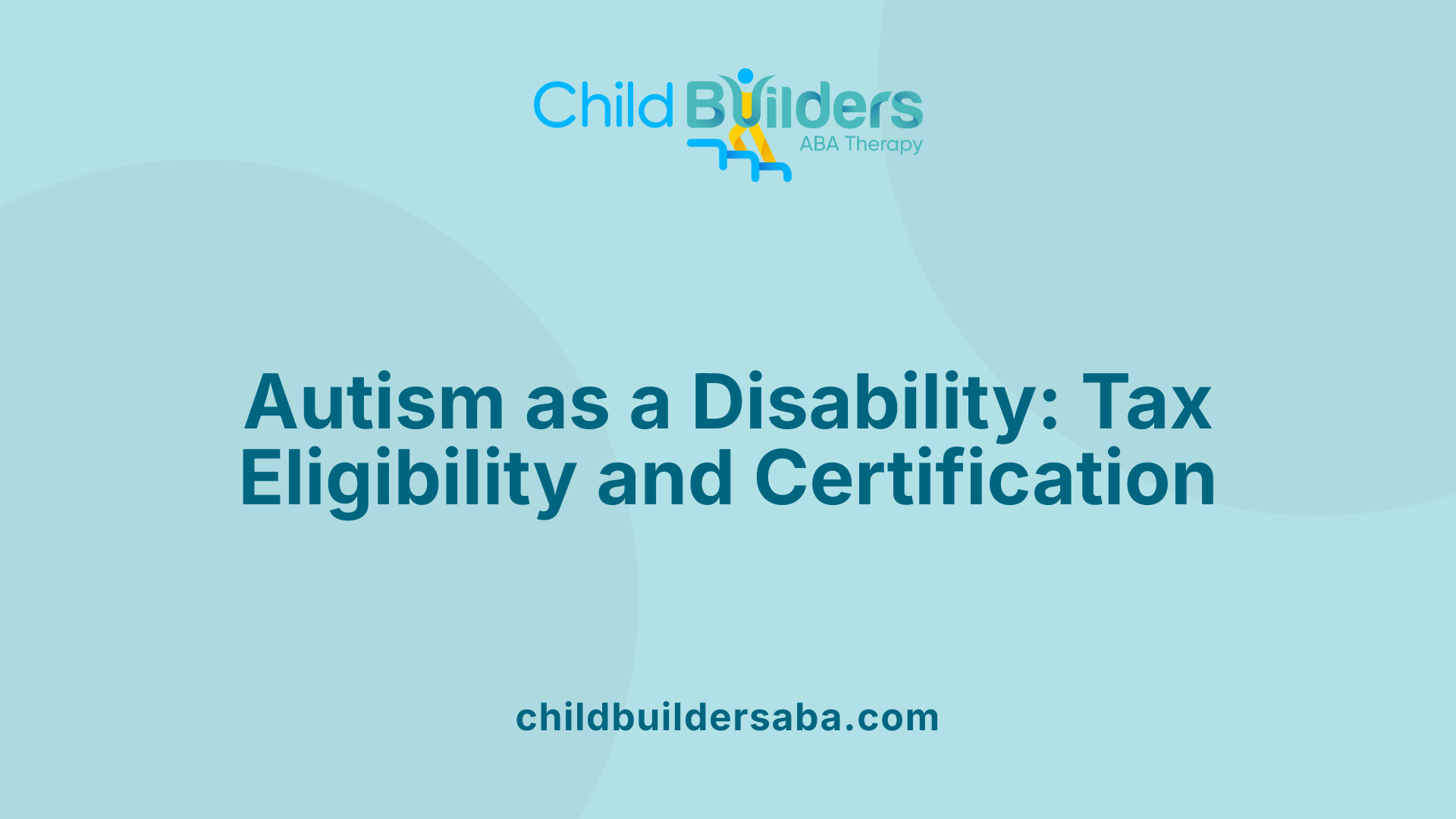
Criteria for qualifying for disability tax credits
To qualify for disability-related tax credits, an individual must have a physical or mental impairment that significantly restricts major life activities. This includes severe and prolonged conditions such as autism. The eligibility often depends on whether a qualified healthcare professional certifies that the person’s condition limits their daily functioning. For children and adults, credentials like medical reports, neuropsychological assessments, and detailed documentation of medical history are essential.
In many jurisdictions, the impairment must be expected to last at least one year or result in death to qualify for the disability tax credit. The certification process typically involves a healthcare provider submitting a formal statement that confirms the severity and permanency of the impairment.
How autism affects eligibility for IRS disability status
Autism, classified as a neurological developmental disorder, can qualify as a disability if it markedly restricts basic activities. The IRS considers autism a disability when it results in long-term restrictions that impair major life activities such as communication, social interaction, or self-care.
In particular, for tax purposes, autism must cause substantial limitations, which are verified through legal and medical criteria. For example, an individual who is unable to perform work-related tasks or daily activities due to autism may be recognized as disabled. Furthermore, if an autistic individual is certified as unable to engage in gainful employment for a year or more, they may qualify for benefits like the Earned Income Tax Credit (EITC) or be considered for dependent status.
Impact on dependents and claims on taxes
Autism can influence how dependents are claimed on tax returns. For children under 13 diagnosed with autism, families might claim them as dependents, benefiting from credits like the Child Tax Credit.
For individuals with autism over age 18, if they meet the criteria for disability, families may claim them as dependents if they are unable to support themselves and require care. Additionally, disabled individuals can qualify for the Child and Dependent Care Credit if they need care services, therapy, or transportation expenses to attend therapy sessions or special programs.
Tax benefits may also include deductions for medical expenses related to autism treatment, therapies, equipment, and home modifications. Many expenses qualify if they are primarily for the treatment or management of autism, and proper documentation such as receipts and medical reports are kept for support.
Medical certification requirements and significance
Certifying autism as a disability involves obtaining a formal statement from a qualified medical practitioner, such as a healthcare provider experienced in autism diagnoses. This certification confirms that the individual’s condition meets the severity and duration requirements set by tax authorities.
Such certification is crucial for accessing disability credits, medical expense deductions, and other financial benefits. It serves as the primary proof needed during tax filing and when applying for specific programs like the Disability Tax Credit or the Registered Disability Savings Plan (RDSP). Proper documentation, including evaluations, prescriptions, and detailed records of services and expenses, reinforces claims and ensures compliance with tax guidelines.
| Aspect | Details | Additional Notes |
|---|---|---|
| Types of qualifying activities | Work limitations, communication, self-care, social interaction | Must substantially impair major life activities |
| Certification process | Medical report, professional certification, detailed documentation | Should specify the duration and impact of disability |
| Expenses that can be claimed | Therapies, medications, specialized equipment, home modifications | Must be primarily for treatment; unreimbursed expenses accepted |
| Benefits available | Disability Tax Credit, earned income credits, claims for dependents | Varies by jurisdiction; consult local tax laws |
| Impact on tax filings | Eligibility influences dependents claimed, deductions, credits | Critical to maintain detailed records for support |
Remaining aware of the specific criteria and documentation requirements helps families and individuals maximize their available tax benefits and ensure compliance with regulations. Consulting with tax professionals is highly recommended to navigate the complexities related to autism and disability tax entitlements.
Tax Treatment of Autism Funding Sources like Medicaid and ABLE Accounts
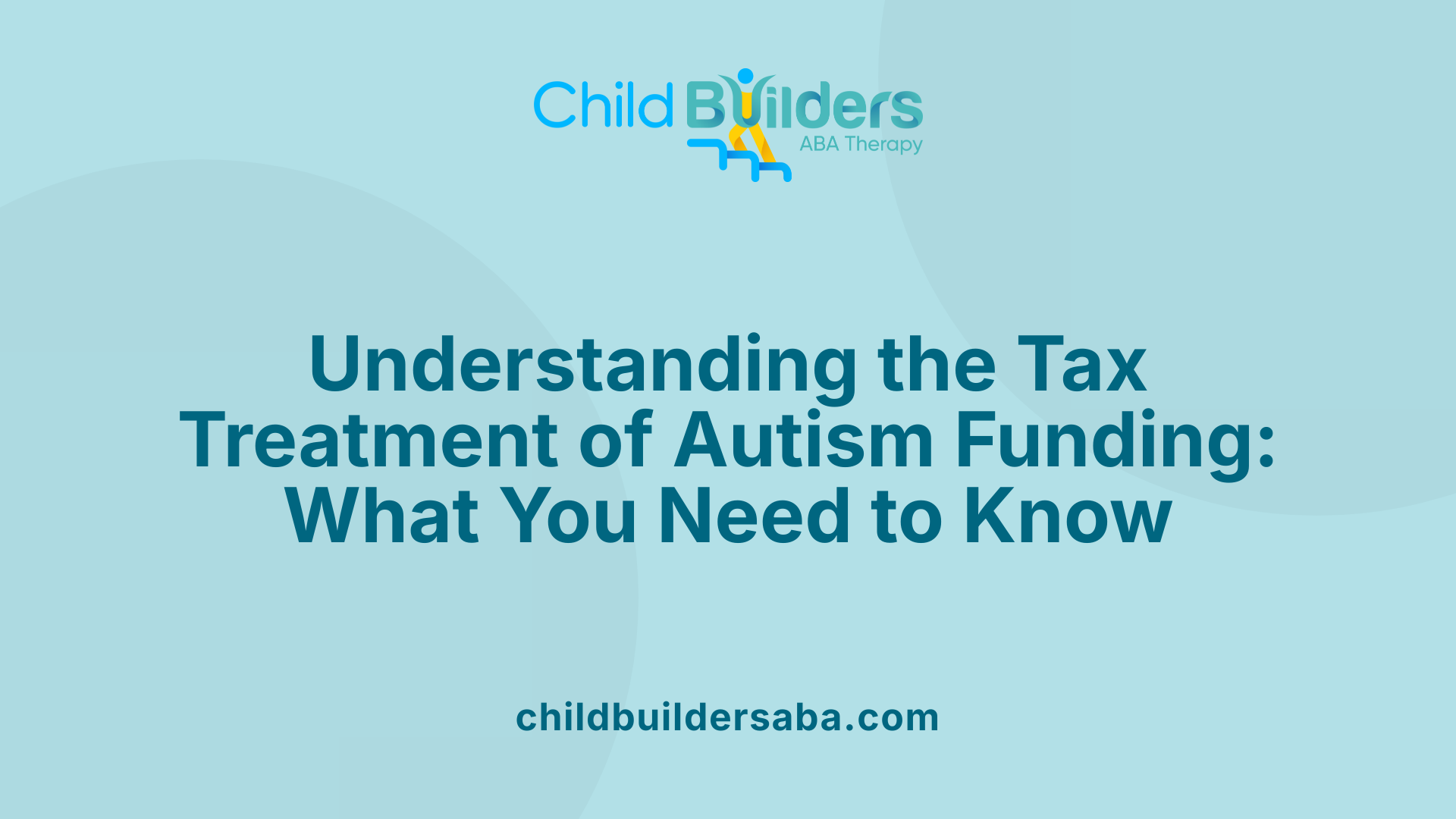
What is the tax treatment of autism funding sources like Medicaid or ABLE accounts?
Funding options such as Medicaid are generally not considered taxable income for the individuals receiving benefits. Medicaid provides essential healthcare coverage, and any benefits paid are exempt from income tax, meaning families and individuals do not need to report these benefits as income on their tax returns.
In contrast, the introduction of ABLE (Achieving a Better Life Experience) accounts has provided a valuable tax-advantaged tool for families managing autism-related expenses. Established under the ABLE Act of 2014, these accounts are designed to help individuals with disabilities save money without losing essential benefits like Medicaid or Supplemental Security Income (SSI).
Contributions to ABLE accounts can be made by the account holder, family members, friends, or others, up to federal gift tax limits—$17,000 for 2024. These contributions are considered gifts and are exempt from federal gift tax when within the annual limit. Once in the account, earnings grow tax-free, provided they are used for qualified disability expenses, including healthcare, housing, transportation, education, and employment support.
Distributions from ABLE accounts used exclusively for qualified expenses are also tax-free, making them an efficient way to save for the future without tax penalties.
Contribution limits and qualified expenses for ABLE accounts
The annual contribution limit for ABLE accounts matches the federal gift tax exclusion, which is $17,000 for 2024. However, some states may have additional limits or variations, so it is vital to check local regulations.
Qualified expenses for ABLE accounts encompass a broad range of costs related to life improvement for individuals with disabilities. These include:
- Medical and dental expenses not covered by insurance
- Housing costs, including rent or mortgage payments
- Transportation, including vehicle modifications and public transit
- Education and independent living supports
- Employment training and support
Funds used for ineligible expenses may incur taxes and penalties, so careful record-keeping is essential.
Impact on eligibility for other benefits like SSI
One of the advantages of ABLE accounts is that the first $100,000 in the account is exempt from the resource limit for SSI, allowing beneficiaries to accumulate savings without losing this vital benefit. However, if the account balance exceeds $100,000, SSI benefits may be suspended until the balance is reduced below this threshold.
Having an ABLE account does not affect Medicaid eligibility, and funds can be used freely for qualified expenses without risking loss of coverage. Moreover, since benefits like Medicaid and Supplemental Security Income are not considered taxable income, they do not increase the taxable income total for the beneficiary.
In summary, Medicaid benefits are non-taxable and support ongoing healthcare needs, while ABLE accounts offer a flexible, tax-advantaged way to save for various disability-related expenses. Managing these funding sources wisely can optimize financial support and benefit eligibility for individuals with autism.
IRS Rules and Publications on Autism Funding and Tax Considerations
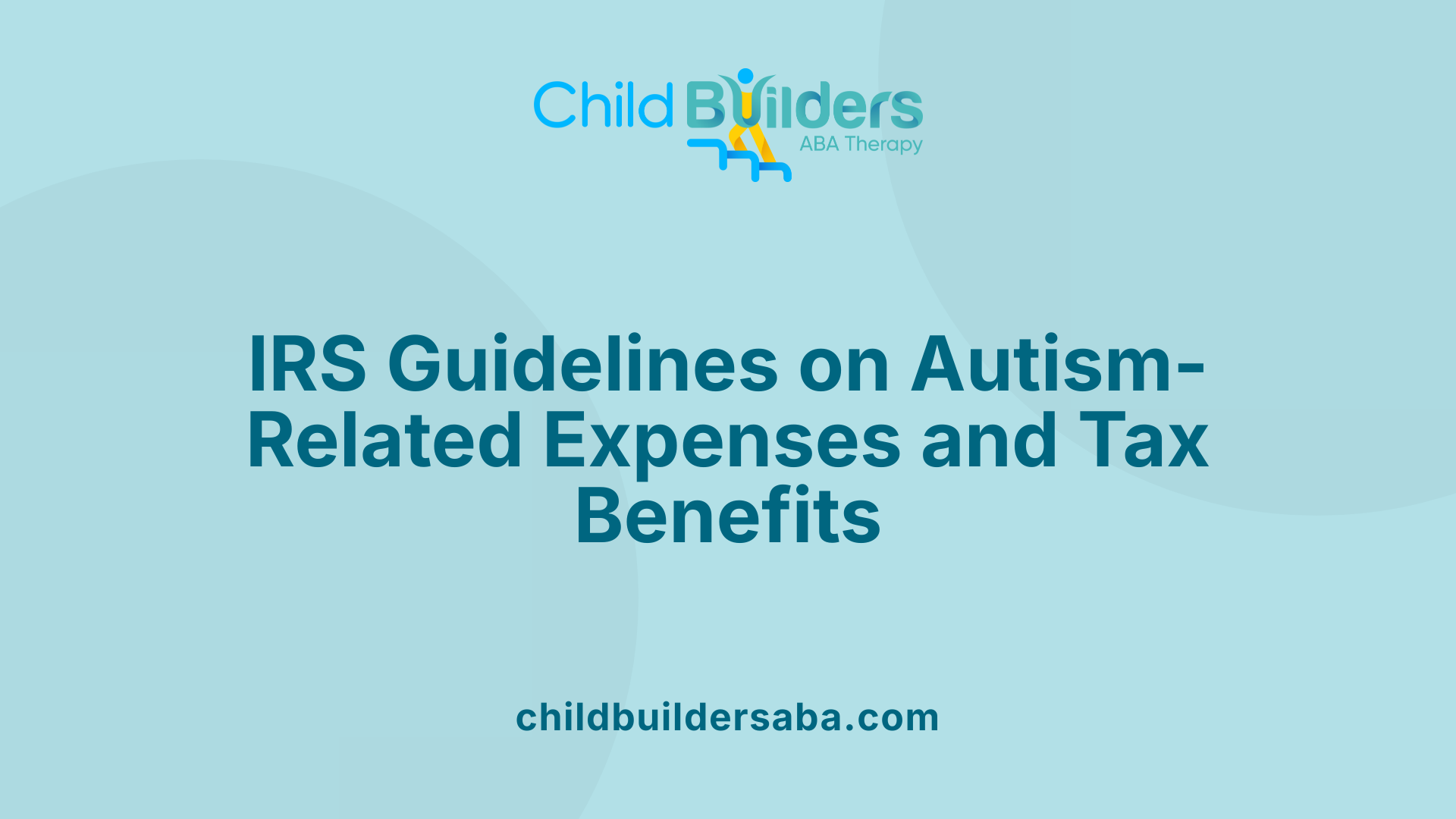
Are there specific IRS rules or publications related to autism funding and tax considerations?
Yes, the IRS offers detailed guidance on managing autism-related expenses and benefits through various publications. Taxpayers seeking to understand deductions, credits, and special assistance programs can refer to multiple IRS publications tailored for different aspects of autism-related costs.
Publication 502 — Medical and Dental Expenses is especially relevant. It outlines which medical expenses can be deducted, including diagnostic evaluations, doctor visits, medications, behavioral therapies, speech therapy, occupational therapy, and home modifications. To qualify, these expenses must be primarily for the diagnosis, treatment, or alleviation of autism-related conditions.
Publication 969 — Health Savings Accounts and Other Tax-Favored Health Plans covers arrangements like Health Savings Accounts (HSAs) and other tax-advantaged accounts, which can help save for medical expenses tax-free, including those related to autism.
Publication 501 — Dependents, Standard Deduction, and Filing Information explains how dependents with disabilities, including those on the autism spectrum, can be claimed and the special considerations for their care.
Publication 524 — Credit for the Elderly or Disabled highlights how individuals with severe disabilities, including autism, might qualify for tax credits based on their circumstances.
Publication 525 — Taxable and Nontaxable Income provides information about which disability benefits and government support payments, such as SSI or VA benefits, are tax-exempt.
Publication 529 — Miscellaneous Deductions includes deductions for travel and transportation expenses related to medical care and home modifications.
Guidance on deductions, credits, and special assistance
Families can benefit from various credits and deductions when managing autism-related expenses. The Child and Dependent Care Credit, for instance, can cover costs for specialized care, therapy, transportation, and equipment of children under 13 or disabled dependents unable to care for themselves.
The IRS also recognizes the importance of home modifications, which can be deductible if recommended by a healthcare professional, even if they increase home value. Travel to medical appointments, including mileage and lodging, can be deducted under certain circumstances.
For individuals with severe impairments, the Disability Tax Credit (DTC) can reduce taxable income. To qualify, a qualified healthcare professional must certify the severity of the condition, indicating significant limitations in major life activities. This credit helps offset the financial burden of autism-related costs.
Additional benefits include the use of tax-advantaged savings accounts like the ABLE (Achieving a Better Life Experience) account, which allows tax-free growth and withdrawals for qualified disability expenses. Contributions to ABLE accounts are limited but do not affect eligibility for government benefits such as Medicaid or SSI.
Other government programs, such as the Supplemental Security Income (SSI) in the U.S. and the Registered Disability Savings Plan (RDSP) in Canada, provide financial assistance that is generally not taxable. These programs can be vital for families managing autism-related expenses.
Overall guidance
To maximize their benefits, families and individuals should keep detailed records of all expenses, including receipts, prescriptions, medical reports, and transportation logs. Consulting with a tax professional familiar with disability and autism funding can be beneficial.
Navigating tax regulations and funding options requires familiarity with IRS publications and awareness of local support programs. Regular updates from IRS sources and professional advice ensure compliance and optimize available financial assistance.
| Publication Number | Focus Area | Relevant Content |
|---|---|---|
| 502 | Medical expenses | Deductibility of therapy, medications, home modifications, and related costs |
| 969 | Health plans | Tax-advantaged accounts for medical expenses |
| 501 | Dependents | Claiming dependents with disabilities, including special considerations |
| 524 | Disabled credits | Eligibility for disabled individuals and related tax benefits |
| 525 | Income reporting | Taxability or exemption of disability benefits |
| 529 | Education savings | Using 529 plans for education expenses, including disabilities |
By familiarizing themselves with these publications, families can better navigate the complex landscape of autism-related tax benefits and funding opportunities, ensuring they receive the support they deserve.
Tax Strategies and Support for Families with Autism Funding
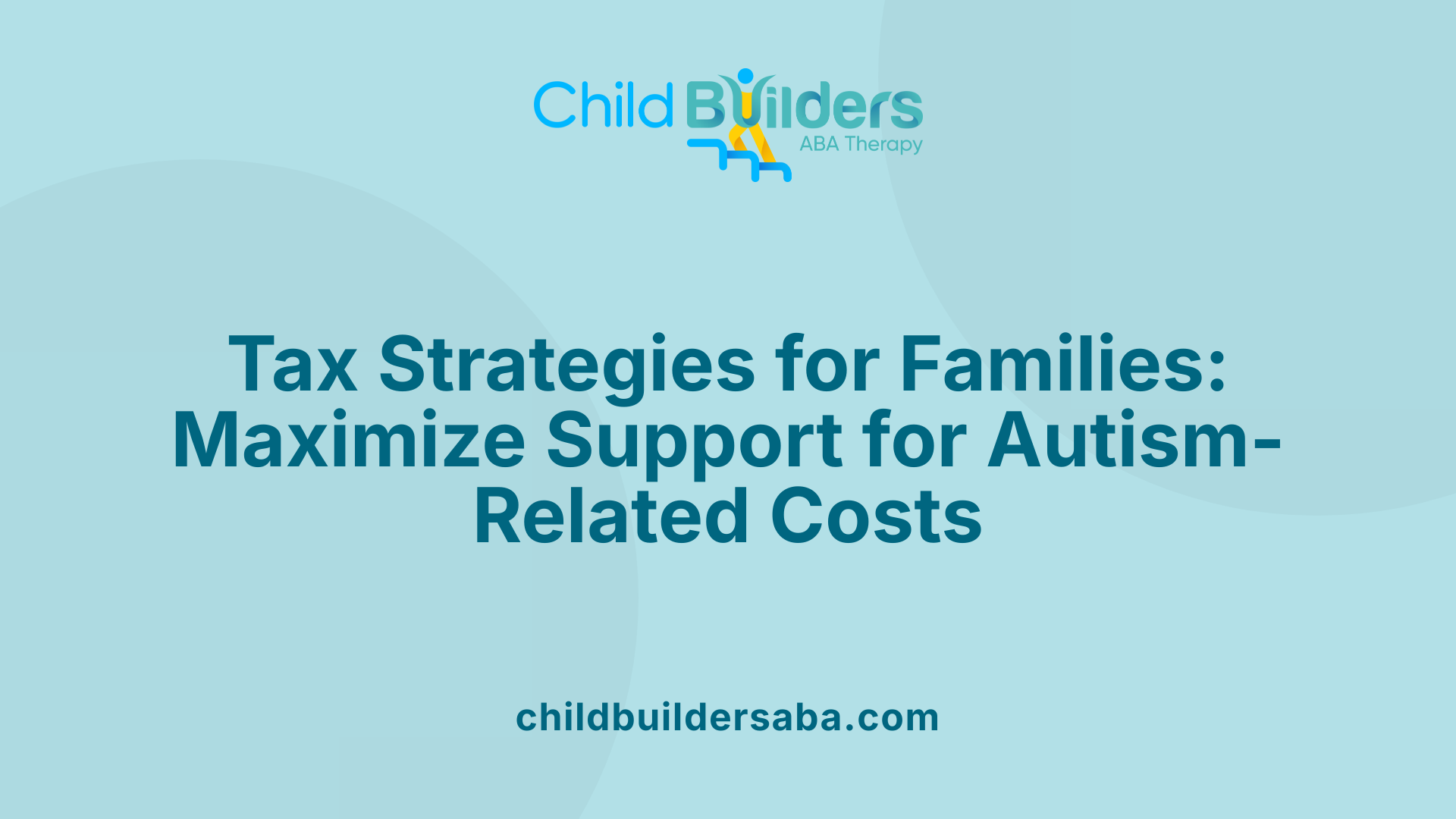
How do tax considerations affect families receiving autism-related financial assistance?
Tax considerations play a vital role in helping families manage the financial challenges associated with autism. Families can leverage various tax credits, deductions, and savings programs to reduce their overall tax burden and stretch available resources.
One of the primary ways to reduce taxes is by claiming qualified medical expenses related to autism care. These expenses include diagnostic evaluations, doctor visits, medications, behavioral therapy, speech therapy, occupational therapy, physical therapy, specialized equipment, home modifications, travel, and transportation costs. To qualify, these expenses must be primarily for the treatment, prevention, or alleviation of autism-related conditions. It's important to note that expenses exceeding 7.5% (or 10%, depending on the jurisdiction) of Adjusted Gross Income (AGI) can be deducted as itemized medical expenses.
In addition, families may benefit from specific tax credits such as the Child and Dependent Care Credit, which covers costs for care providers who assist children under 13 or disabled dependents who cannot care for themselves. This credit generally ranges from 20% to 35% of eligible expenses, with limits depending on income levels.
Other valuable credits include the Earned Income Tax Credit (EITC), which can be claimed if the family’s income falls within certain thresholds and the autistic child qualifies as a disabled dependent. For families in Canada, the Disability Tax Credit (DTC) lowers income taxes payable when a qualified medical practitioner certifies the severity of the impairment.
Moreover, tax-advantaged accounts such as Flexible Spending Accounts (FSAs), Health Savings Accounts (HSAs), and 529 education plans with disability incentives provide additional avenues for financial planning. For example, 529 plans in the US can be utilized for educational expenses, including those related to special education accommodations.
Maximizing benefits through proper documentation and claims
Accurate and comprehensive documentation is essential for qualifying for these tax benefits. Families should retain receipts, prescriptions, insurance reimbursements, medical reports, evaluations, travel records, and detailed expense logs. Proper documentation supports claims for deductions and credits and reduces the risk of audit issues.
In the US, medical expenses such as home modifications, transportation for medical purposes, and costs associated with specialized schooling must be supported by detailed records. Similarly, in Canada, medical reports and certification from qualified practitioners are necessary for the Disability Tax Credit. Claims related to attending conferences, seminars, or travel for medical assessments should also be well-documented.
Utilising tax-advantaged accounts and programs
Utilizing programs like the ABLE account allows individuals with disabilities to save tax-free for qualified expenses, including those related to autism. Contributions to ABLE accounts are limited to $17,000 per year for 2024, and distributions used for qualified expenses are tax-free.
In the United States, the use of 529 plans can include disability-specific savings, with certain tax incentives that do not affect eligibility for federal benefits like Medicaid. In Canada, the Registered Disability Savings Plan (RDSP) offers government grants and bonds to help families save for a child’s future.
Many state and provincial government programs also provide grants, respite care, and therapy subsidies that are generally exempt from taxation. These programs aim to lessen the financial strain and expand access to necessary services.
The importance of consulting tax professionals
Tax laws and benefits related to autism funding are complex and subject to change. Consulting a knowledgeable tax professional ensures families maximize their benefits while remaining compliant. Professionals can help interpret eligibility requirements, assist with proper documentation, and identify opportunities for additional deductions or credits tailored to each family's situation.
Moreover, tax advisors can guide families on strategic use of accounts like FSAs, HSAs, and ABLE plans and advise on how to handle multiple sources of funding including insurance reimbursements, government benefits, and charitable donations.
Adjustments for different income levels and eligibility criteria
Eligibility for certain benefits varies depending on income and family circumstances. For instance, the Child and Dependent Care Credit and EITC are income-dependent, with thresholds that determine the percentage of expenses covered and the amount of credit received.
Similarly, high-income families might benefit from different strategies or might phase out some benefits entirely. It's crucial to assess individual eligibility carefully and make the most of available resources.
In conclusion, understanding and navigating the tax provisions related to autism funding requires careful planning, documentation, and professional guidance. By doing so, families can significantly alleviate financial burdens and access comprehensive support tailored to their needs.
| Benefit/Program | Description | Eligibility Criteria | Tax Implication |
|---|---|---|---|
| Medical Expense Deduction | Including therapies, home modifications, travel | Expenses must exceed 7.5-10% of AGI, supported by receipts | Deductible on itemized return |
| Child and Dependent Care Credit | Costs for care providers | Care for dependents under 13 or disabled | 20-35% of expenses, varies with income |
| Earned Income Tax Credit | For low to moderate income families | Income limits, disability status | Refundable credit, reduces tax owed |
| Disability Tax Credit (Canada) | For severe disabilities including autism | Medical certification required | Reduces income tax payable |
| ABLE Account | Tax-free savings for disability expenses | Contribution up to $17,000/year | No tax on qualified distributions |
| 529 Plans and RDSP | Education savings for persons with disabilities | Specific rules for disability inclusion | Tax incentives, tax-free growth |
Staying informed and organized is vital for families seeking to maximize tax benefits for autism-related expenses. Regular consultations with tax professionals and diligent record-keeping ensure compliance and positive financial outcomes.
Empowering Families with Knowledge for Better Tax Planning
Understanding the tax implications of autism funding and expenditures empowers families to make informed financial decisions. Most autism supports are not taxable but knowing the specifics of allowable deductions, benefits, and credits can lead to significant savings. Proper documentation, awareness of applicable IRS publications, and professional consultations are essential tools for maximizing benefits while staying compliant with tax laws. Awareness of the tax treatment of sources like Medicaid and ABLE accounts also helps avoid unexpected liabilities. By leveraging available programs and credits, families can better manage the financial aspects of autism support, ultimately enhancing their ability to access necessary services and improve quality of life.
References
- What Autism-Related Benefits and Taxes can I Claim?
- Are There any Autism-Related Benefits or Tax Breaks You Can Claim?
- Is Autism a Disability? | General Definition, Tax Purposes
- What Autism-Related Benefits and Taxes can I Claim? - AutismBC
- Is Autism Funding Taxable? - The Funding Family
- Is autism considered a diability? - TurboTax Support - Intuit
- Autism & Taxes: Unlocking Tax Benefits for Families (2024) - XOA TAX
- ABLE Accounts - The Autism Community in Action
- [PDF] Publication 3966 (Rev. 5-2021) - IRS
- Tax Strategies for Special Needs Families





.jpg)































































































